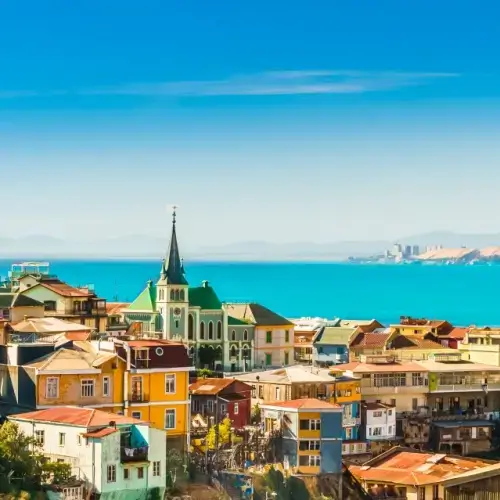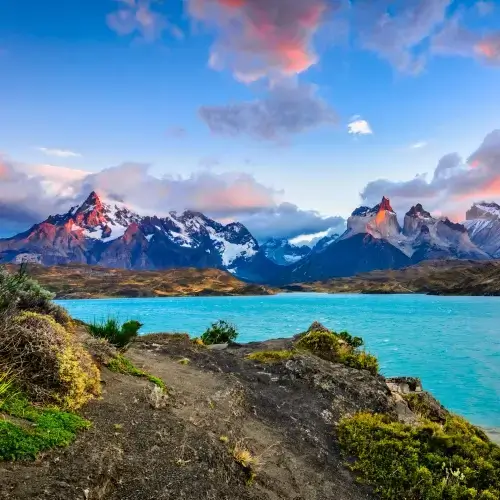Home / Compare Travel Insurance / Travel insurance for Chi…

Key takeaways
- If you’re planning on travelling to the world’s longest country, you’ll want to have an adequate level of travel insurance in place.
- Australia does not have a Reciprocal Health Care Agreement with Chile, so any medical expenses you incur will need to be covered either by insurance or out of your own pocket.
- Different insurers and policies will offer varying levels of cover and optional extras, so be sure to do your research and choose a policy that suits your needs.
Expert tips for choosing travel insurance for Chile
Our Executive General Manger of General Insurance, Adrian Taylor, has some tips for Australians looking to travel to Chile.

Assess the risks before choosing a policy
If you’re trying to choose a level of cover, you may want to visit the Australian Government’s Smartraveller page for Chile. This will provide you with the latest travel advice for Chile and the specific risks and threats associated with different parts of the country, making it easier for you to decide what you do and don’t need cover for.
You could lower your premiums with a higher excess
If the cost of travel insurance is a concern for you, you could consider opting to pay a higher excess if you need to make a claim. This will typically reduce your payable premium, saving you money upfront. However, if you do end up making a claim, having chosen a higher excess will mean you either have to pay more at the time of claiming, or receive a smaller benefit if your claim is successful.
It pays to compare!
If you’re travelling to Chile and want to take out comprehensive travel insurance, don’t just take out the first policy you find! Make comparing your options the first step of your travel insurance plans, with our online travel insurance comparison service – and if you find a policy you like, we can help you apply for it too!
Do I need travel insurance for Chile?
 Whether you’re looking for multi-trip travel insurance or just need travel insurance for a single trip to Chile, having an appropriate travel insurance policy in place could provide you with peace of mind, knowing you’re covered in case something happens to you or your belongings.
Whether you’re looking for multi-trip travel insurance or just need travel insurance for a single trip to Chile, having an appropriate travel insurance policy in place could provide you with peace of mind, knowing you’re covered in case something happens to you or your belongings.
Even backpackers and students with lower incomes may want to consider taking out basic travel insurance (also known as medical-only travel insurance) if they’re travelling to Chile.
When travelling to Chile specifically, you may want to be wary of hazards including:1
- Natural disasters including earthquakes, volcanic eruptions, flooding and tsunamis.
- Political demonstrations, which are common in central Santiago and the centre of Valparaiso. Not only does Smartraveller warn that these events can become violent, but that Chilean law prohibits foreigners from partaking in political activity. This means that participation in something like a rally or protest could result in you being detained and/or deported.
- Zika virus and dengue fever – Easter Island has had outbreaks of both mosquito-borne viruses in the past, so if your travel plans include visiting the home of the mo’ai, you’ll want to pack mosquito repellent and cover up as much as possible.
What should travel insurance for Chile include?
Your level of insurance coverage will vary depending on what insurance company and type of policy you go with, but you may want to consider looking for a travel insurance policy that covers you for some or all of the following events.
Medical coverage
First and foremost, even of the most basic of international travel insurance policies will include medical insurance, to help cover the cost of any medical emergencies you experience or medical assistance you require while in Chile. You’ll typically also be covered for medical evacuation/repatriation if necessary.
Comprehensive travel insurance policies can include cover for pre-existing medical conditions, but you’ll need to formally flag any condition(s) you have with the insurer before you take out the policy. Otherwise, you won’t be covered for any medical or emergency assistance you require relating to said condition(s).
You may also be covered for coronavirus-related health expenses, but it’ll usually be an optional extra that you’ll need to pay an additional premium for.
Theft or loss of luggage and belongings
Depending on the level of cover you take out, you may be covered for damage to or the loss of your personal effects and valuables. This can include, but isn’t limited to, your phone, cash and credit cards, your passport and your luggage.
While this type of cover will typically protect you against theft or loss, it won’t cover you in the event that your belongings are lost or stolen due to your own negligence.
While visiting Chile, visitors will want to look out for pickpocketing, which often happens in busy, crowded spaces including public transport, outdoor cafes, markets and shopping centres.1
Trip cancellation or delays
In the event that you experience disruptions or trip interruptions, or your trip is cancelled entirely due to unforeseen circumstances, cancellation cover may help to cover some of your trip costs, or the costs stemming from a delay to your travel plans.
For example, if a connecting flight is delayed and you have to spend a night in a hotel as a result, travel insurance may help to cover the resulting accommodation costs. If your trip has to be cancelled entirely, your travel insurance could cover certain costs including booked flights and accommodation.
However, you won’t be covered for trip cancellation in all scenarios. Check the Product Disclosure Statement (PDS) of any policy you’re thinking of taking out to see what scenarios would be covered.
Rental vehicle excess
If you’re planning on renting a vehicle in order to see the Atacama Desert or Patagonia and the Andes (or any of the myriad other beautiful sights that Chile has to offer), you may want to look for a policy that includes rental vehicle excess cover.
This will save you having to pay a car insurance excess out of pocket in the event that you crash your rental vehicle. Different insurers and policies will offer varying amounts of rental vehicle excess cover, but while it will be included on some comprehensive travel insurance policies, for others you will need to add the additional cover as an optional extra.
Personal liability
Personal liability cover provides financial protection in the event that you cause harm to someone else or damage to their property. If you’re responsible for someone being injured or otherwise in need of medical assistance, personal liability cover may help to cover their medical expenses, saving you from paying them out of pocket.
What won’t travel insurance cover in Chile?
 Some common exclusions found on international travel insurance policies that will typically apply while you’re in Chile include:
Some common exclusions found on international travel insurance policies that will typically apply while you’re in Chile include:
- Theft or loss of your belongings due to your own negligence (e.g. leaving them unattended in a public place)
- Injury or harm that happened while you were under the influence of drugs and/or alcohol
- Loss or harm resulting from unlawful behaviour
- The claim relates to a pre-existing condition that you didn’t declare, and subsequently isn’t covered by your travel insurance policy
- Damage or loss sustained while partaking in adventure sports such as base jumping, mountain biking and rock climbing, if you don’t have the optional cover.
Check the PDS of any travel insurance policy you’re considering taking out for a definitive list of what isn’t covered under that policy.
Do I need a visa to travel to Chile?
Smartraveller advises that if you’re an Australian citizen, you should get a visa before travelling to Chile. If your travel plans include a stopover or transit point in Chile, contact the nearest Chilean embassy to check if you need a visa or not.1
Meet our travel insurance expert, Adrian Taylor
As a General Insurance expert with over 13 years’ experience in financial services, Adrian Taylor believes in educating customers about the importance of travel insurance so that anyone can kick back and make the most of their time away from home. While no one wants a disrupted holiday, a suitable travel insurance policy can provide a financial safety net for yourself, your belongings and your trip in case things go wrong.
¹ Smartraveller – Chile. Accessed October 2024.


